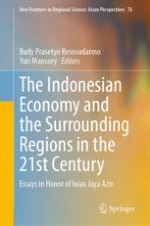2024 | OriginalPaper | Buchkapitel
10. Education and Expenditure Inequality in Indonesia and the Philippines: A Comparative Analysis in an Urban and Rural Dual Framework
verfasst von : Takahiro Akita, Sachiko Miyata
Erschienen in: The Indonesian Economy and the Surrounding Regions in the 21st Century
Verlag: Springer Nature Singapore
Aktivieren Sie unsere intelligente Suche, um passende Fachinhalte oder Patente zu finden.
Wählen Sie Textabschnitte aus um mit Künstlicher Intelligenz passenden Patente zu finden. powered by
Markieren Sie Textabschnitte, um KI-gestützt weitere passende Inhalte zu finden. powered by
